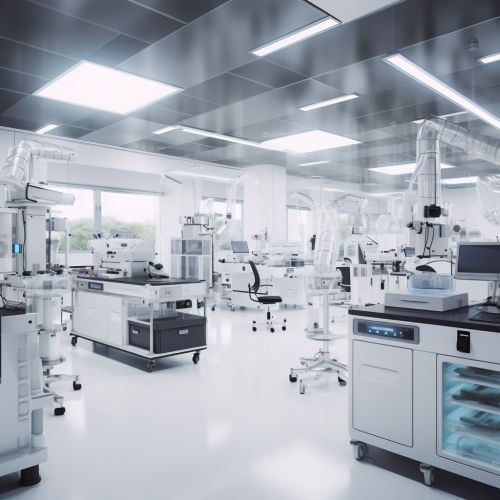Medical Technology
Introduction
Medical technology, also known as healthcare technology, is a broad field where innovation plays a crucial role in sustaining health. It involves the application of organized knowledge and skills in the form of devices, medicines, vaccines, procedures, and systems developed to solve a health problem and improve quality of lives. This field intersects with many other areas of science and technology, including biotechnology, pharmaceutical science, information technology, and engineering.
History
The history of medical technology dates back to ancient times. In these times, people used primitive instruments and believed in the divine for healing. As time passed, medical technology evolved from the basic hands-on healing to the complex, high-tech world of medicine we know today.
Types of Medical Technology
There are several different types of medical technology, including:
- Diagnostic equipment: This includes medical imaging machines, used to aid in diagnosis. Examples are ultrasound and MRI machines, PET and CT scanners, and x-ray machines.
- Therapeutic equipment: This category encompasses medical devices that are used to help treat a condition. Examples include infusion pumps, medical lasers, and LASIK surgical machines.
- Life support equipment: These machines are used to maintain a patient's bodily function. This includes medical ventilators, anaesthetic machines, heart-lung machines, ECMO, and dialysis machines.
- Medical laboratory equipment: These are used to analyse urine, blood, and genes. Examples include automated analysers, blood culture system, electrolyte analysers, and coagulation analysers.
- Medical software: An emerging branch of medical technology, these are applications that process healthcare data, images, or support patient care or treatment. Examples include electronic health records, therapeutic software, and digital imaging and communications in medicine (DICOM).


Impact of Medical Technology on Healthcare
Medical technology has significantly impacted healthcare delivery. These technologies have not only changed the way healthcare is being delivered but also the way it's being perceived. They have made significant improvements in the health of the individuals and the life expectancy of populations globally. Medical technology saves lives, improves patient comfort, and shortens hospital stays. It also supports research and innovation, leads to new procedures for diagnosing and treating diseases, and improves health outcomes.
Future of Medical Technology
The future of medical technology is promising, with ongoing advancements and discoveries. The integration of artificial intelligence and machine learning in healthcare is expected to revolutionize medical technology. Other future trends include the rise of telemedicine, personalized medicine, and the Internet of Medical Things (IoMT).
